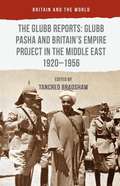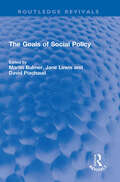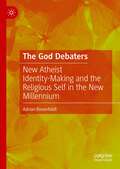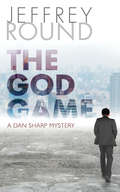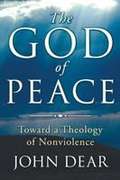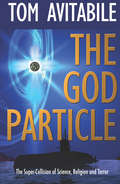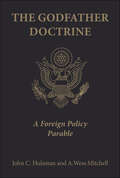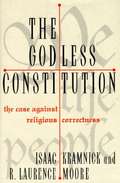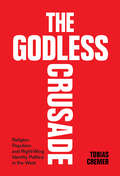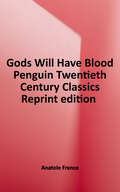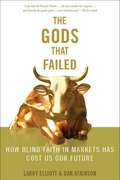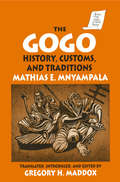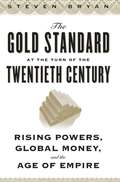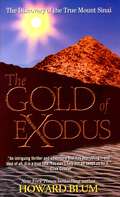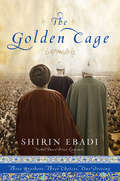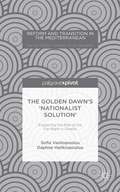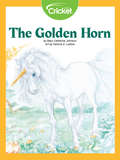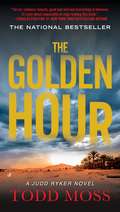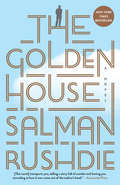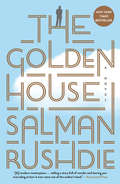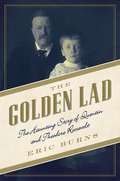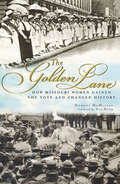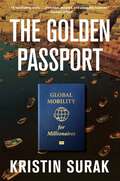- Table View
- List View
The Glubb Reports: Glubb Pasha and Britain's Empire Project in the Middle East 1920-1956 (Britain and the World)
by Tancred BradshawThe Glubb Reports studies papers written by General Sir John Glubb, the long-serving British commander of the Jordanian Arab Legion. It covers issues such as the role of tribes and desert control, the impact of Palestine, the Arab Legion's role in the first Arab-Israeli war, the expansion of the Arab Legion, and Glubb's dismissal in 1956.
The Goals of Social Policy (Routledge Revivals)
by Jane Lewis Martin Bulmer David PiachaudFirst published in 1989, The Goals of Social Policy is an invaluable text that will give students an admirable introduction to the central concerns of the study of social policy. It asks what have been the traditional concerns of social policy as a subject of academic study, and what its context should be in the changed political environment of twenty-first century. Three issues receive close attention for their future implications: social policy and the family (focusing on gender), social policy and community (including race and public order issues) and social policy and the economy. Retrospective chapters examine the relationship between social policy and social research, social theory and social work. The book will appeal particularly to students of social policy, social work, sociology and political science, as well as to those in applied fields such as criminology, health studies, education and women’s studies with interests in social policy. It will also appeal to the general reader interested in keeping abreast of the latest thinking about social policy.
The God Debaters: New Atheist Identity-Making and the Religious Self in the New Millennium
by Adrian RosenfeldtThis book examines the post-9/11 God debate in the West. Through a close study of prominent English God debaters Richard Dawkins, Karen Armstrong, Christopher Hitchens, and Terry Eagleton, Adrian Rosenfeldt demonstrates that New Atheist and religious apologist ideas and arguments about God, science, and identity are driven by mythic autobiographical narratives and Protestant or Catholic cultural heritage. This study is informed by criticism of the New Atheist polemic as being positivistic, and the religious apologists as propagating “sophisticated theology.” In both cases, the God debaters are perceived as disassociating themselves from human lived experience. It is through reconnecting the God debaters’ intellectual ideas to their cultural and social background that the God debate can be grounded in a recognisable human reality that eludes reductive distinctions and disembodied abstractions.
The God Game: A Dan Sharp Mystery
by Jeffrey RoundPrivate investigator Dan Sharp finds himself caught up in a political murder. When the husband of a Queen’s Park aide runs off to escape his gambling debts, private investigator Dan Sharp is hired to track him down. As the city’s political landscape verges on the bizarre — with a crack-using mayor and a major scandal looming — Dan finds himself pitted against a mysterious figure known for making or breaking the reputations of upcoming politicians. It’s not until a body turns up on his doorstep that Dan realizes he’s being punished for sticking his nose into dirty politics. It’s left to him to catch the killer and prove his own innocence.
The God Of Peace: Toward A Theology Of Nonviolence
by John Dear"The God of peace is never glorified by human violence." Thomas Merton <P><P> 'The God of Peace', John Dear's classic theology of nonviolence, broke new ground when it was first published as a breakthrough toward a new understanding of scripture, theology, social concerns and churches issues--from the perspective of Gospel nonviolence, in the tradition of Mahatma Gandhi, Martin Luther King, Jr., and Dorothy Day. <P><P> This ground-breaking study begins not just with the culture of violence, but the nonviolence of God, and the revolutionary nonviolence of Jesus. From the start, John Dear explores traditional areas of theology, such as Christology, Trinitarian Theology, anthropology, sin, redemption, theodicy, salvation, ecclesiology, eschatology, spirituality, liturgy, Catholic social teaching, the "just war theory,", feminism, liberation theology and the consistent ethic of life. This text will help university and theology students pursuing the theology and spirituality of nonviolence, as well as ordinary Christians and activists interested in the crucial connection between war and violence, and God and nonviolence.
The God Particle
by Tom AvitabileWhen the smallest imagined particle of matter threatens to destroy all that matters, science and religion collide on the world stage and within the corridors of power. Presidential Science Advisor William "Wild Bill" Hiccock and his top-secret Quarterback Operations Group (QUOG) has already faced down some of the most sinister high-tech rivals imaginable. Now they must face one that can eliminate all life on Earth in an instant.THE GOD PARTICLE is a super-kinetic thriller that pits brains, religion, political power, and common humanity against the onslaught of extremely dangerous, narrowly focused scientific exploration into the fabric of creation, complete with a plot to shoot down one of the President's helicopters. Fringe religious groups - but not the usual suspects - engage in terror. Ugly espionage is set against the beauty of the Cote D'Azur. The romance of Paris offsets the grit of Boston's South of Roxbury while the Euro-pop discos of Switzerland punctuate the quest.In the end it comes down to one question: Can former FBI agent Brooke Burrell, now QUOG's lead operative, choose between her personal and professional life in time to solve the puzzle and stop it all?
The Godfather Doctrine: A Foreign Policy Parable
by John C. Hulsman A. Wess MitchellThe Godfather Doctrine draws clear and essential lessons from perhaps the greatest Hollywood movie ever made to illustrate America's changing geopolitical place in the world and how our country can best meet the momentous strategic challenges it faces. In the movie The Godfather, Don Corleone, head of New York's most powerful organized-crime family, is shockingly gunned down in broad daylight, leaving his sons Sonny and Michael, along with his adopted son, consigliere Tom Hagen, to chart a new course for the family. In The Godfather Doctrine, John Hulsman and Wess Mitchell show how the aging and wounded don is emblematic of cold-war American power on the decline in a new world where our enemies play by unfamiliar rules, and how the don's heirs uncannily exemplify the three leading schools of American foreign policy today. Tom, the left-of-center liberal institutionalist, thinks the old rules still apply and that negotiation is the answer. Sonny is the Bush-era neocon who shoots first and asks questions later, proving an easy target for his enemies. Only Michael, the realist, has a sure feel for the changing scene, recognizing the need for flexible combinations of soft and hard power to keep the family strong and maintain its influence and security in a dangerous and rapidly changing world. Based on Hulsman and Mitchell's groundbreaking and widely debated article, "Pax Corleone," The Godfather Doctrine explains for everyone why Francis Ford Coppola's epic story about a Mafia dynasty holds key insights for ensuring America's survival in the twenty-first century.
The Godless Constitution: The Case Against Religious Correctness
by Isaac Cramnick R. Laurence MooreScholars Kramnick (government, Cornell) and Moore (history, Cornell) have abandoned the "scholarly apparatus" of footnotes and bibliography in favor of an impassioned polemic on separation of church and state aimed at a popular audience. They present the case that strict separation of church and state, while a source of debate from the nation's founding onward, was indeed the intent of the founders. The vision of a limited, secular state populated by a religious and moral citizenry was at the heart of the new American republic. Using well-selected historical examples, they distinguish "between a religiously informed politics and the politics of religious correctness." The debate about the proper balance between church and state continues today, perhaps approaching its highest pitch since the Constitutional period. The authors ably present a timely and important topic in this election year in all its historical context and complexity.
The Godless Crusade: Religion, Populism and Right-Wing Identity Politics in the West
by Tobias CremerThis book postulates that the rise of right-wing populism in the West and its references to religion are less driven by a resurgence of religious fervour, than by the emergence of a new secular identity politics. Based on exclusive interviews with 116 populist leaders, key policy makers and faith leaders in the USA, Germany, and France, it shows how right-wing populists use Christianity as a cultural identity marker of the 'pure people' against external 'others' while often remaining disconnected from Christian values, beliefs, and institutions. However, right-wing populists' willingness and ability to employ religion in this way critically depends on the actions of mainstream party politicians and faith leaders. They can either legitimise right-wing populists' identitarian use of religion or challenge it, thereby cultivating 'religious immunity' against populist appeals. As the populist wave breaks across the West, a new debate about the role of religion in society has begun.
The Gods Will Have Blood
by Anatole FranceIt is April 1793 and the final power struggle of the French Revolution is taking hold: the aristocrats are dead and the poor are fighting for bread in the streets. In a Paris swept by fear and hunger lives Gamelin, a revolutionary young artist appointed magistrate, and given the power of life and death over the citizens of France. But his intense idealism and unbridled single-mindedness drive him inexorably towards catastrophe. <p><p>Published in 1912, The Gods Will Have Blood is a breathtaking story of the dangers of fanaticism, while its depiction of the violence and devastation of the Reign of Terror is strangely prophetic of the sweeping political changes in Russia and across Europe.
The Gods that Failed: How Blind Faith in Markets Has Cost Us Our Future
by AtkinsonOver the past three decades, governments have ceded economic control to a new elite of free-market operatives and their colleagues in national and international institutions like the IMF, the World Bank, and the World Trade Organization. They promised economic stability but have delivered chaos. Their speculation has left the global economy more vulnerable to a financial collapse than any time since 1929. Two leading financial journalists dissect this financial elite, tracing their origins to a secretive gathering of free-market economists in 1947, and propose a series of far-reaching reforms that can save us from a new depression.
The Gogo: History, Customs, and Traditions (Sources And Studies In World History Ser.)
by Mathius E. Mnyampala Gregory MaddoxA reconstruction of the history and customs of the Gogo people of Africa, based in part on oral histories, tribal legends and myths. This work was first published in Swahili in 1954 and was sponsored by the British Colonial government in an attempt to promote "tribal" cohesion.
The Gold Standard at the Turn of the Twentieth Century: Rising Powers, Global Money, and the Age of Empire (Columbia Studies in International and Global History)
by Steven BryanBy the end of the nineteenth century, the world was ready to adopt the gold standard out of concerns of national power, prestige, and anti-English competition. Yet although the gold standard allowed countries to enact a virtual single world currency, the years before World War I were not a time of unfettered liberal economics and one-world, one-market harmony. Outside of Europe, the gold standard became a tool for nationalists and protectionists primarily interested in growing domestic industry and imperial expansion.This overlooked trend, provocatively reassessed in Steven Bryan's well-documented history, contradicts our conception of the gold standard as a British-based system infused with English ideas, interests, and institutions. In countries like Japan and Argentina, where nationalist concerns focused on infant-industry protection and the growth of military power, the gold standard enabled the expansion of trade and the goals of the age: industry and empire. Bryan argues that these countries looked less to Britain and more to North America and the rest of Europe for ideological models. Not only does this history challenge our idealistic notions of the prewar period, but it also reorients our understanding of the history that followed. Policymakers of the 1920s latched onto the idea that global prosperity before World War I was the result of a system dominated by English liberalism. Their attempt to reproduce this triumph helped bring about the global downturn, the Great Depression, and the collapse of the interwar world.
The Gold of Exodus: The Discovery of the True Mount Sinai
by Howard BlumMount Sinai. For many, it is the most sacred place on Earth-the site where God descended to give Moses the Ten Commandments. Yet for centuries, mankind has not known its exact location. In this heart-pounding true story, award-winning journalist and bestselling author Howard Blum tells the enthralling account of two modern-day adventurers-Larry Williams, a two-time Republican candidate for the U.S. Senate from Montana and a self-made millionaire, and his friend Bob Cornuke, a retired policemen and former SWAT team member. Lured by the prospect of finding the fabled fortune in gold that the ancient Hebrews took with them when they fled from Egypt, the two men set out to find the true site of Mount Sinai-with only the Old Testament as a guide. Eminent biblical scholars at Harvard and the University of Pennsylvania have argued that Mount Sinai is not in the Sinai Peninsula at all, but rather in northwestern Saudi Arabia. However, they were never allowed into the kingdom to prove their argument. When Cornuke and Williams are also denied entry, they daringly sneak into Saudi Arabia. And what they discover at the mountain known as Jabal al Lawz will astonish the world-and inspire readers to rethink the role of the Bible in history. They find the remains of the stone altar at which the Golden Calf was worshiped, the twelve pillars that Moses ordered to be erected, the cave where Moses slept, and, most sensationally, the unnaturally scorched spot on the mountaintop where God gave Moses the two stone tablets. They also explain, in a fascinating account, the truth about the parting of the Red Sea waters. And not the least of their discoveries is the fact that one of the most sacred spots on earth is now a top secret Saudi military base. As these two adventurers follow in Moses' footsteps, they become pawns in a dangerous game of international power politics and intrigue, This action-packed tale-part high-tech treasure hunt, part modern-day spy thriller, and part biblical detective story-is riveting. And it is all true.
The Golda Meir Story
by Margaret DavidsonThis readable story was revised in 1981 to include the last years of Meir's life. It presents her years in the kibbutz and as prime minister, helping to establish the independent state of Israel.
The Golden Cage: Three Brothers, Three Choices, One Destiny
by Shirin Ebadi"If you do not have the power to overthrow the rule of oppression, inform others of the oppression."--Persian proverb For over fifty years the Shah Pahlavi dynasty ruled Iran until Ayatollah Khomeini's 1979 Islamic Revolution seized power and began its own reign of tyranny. The questions about the revolution shape The Golden Cage while the answers shed light on Islamic Iran's current events and tell us why it strives for nuclear energy, chants "Death to Israel," and claims to be the most powerful force in the Middle East and Muslim world. History perhaps is best described through life stories we each can hold dearly. The Golden Cage is one such story about three brothers the author knew through their sister, Pari, a childhood friend. Each brother subscribes to a different political ideology that tears Iran and their lives apart. As Pari observes, her brothers live deluded lives in golden cages of ideology. These words mark the beginning of this story, illuminating the multifaceted, oppressive Iran of today and years past.
The Golden Dawn’s ‘Nationalist Solution’: Explaining the Rise of the Far Right in Greece
by Sofia Vasilopoulou Daphne HalikiopoulouThis book contextualizes the rise of the Golden Dawn within the Eurozone crisis. The authors argue that the movement's success may be explained by the extent to which it was able to respond to the crisis of the nation-state and democracy in Greece with its 'nationalist solution': the twin fascist myths of social decadence and national rebirth.
The Golden Horn
by Mary Catherine JohnsonA young unicorn wants a gold horn but his is white. The only way to change it is to do good deeds for others. While on his journey, the unicorn can’t find any—will he ever get his gold horn?
The Golden Hour
by Todd MossAn extraordinary thriller debut of twenty-first-century espionage, by a former deputy assistant secretary of state who "knows where all the bodies are buried--literally" (W. E. B. Griffin). The Golden Hour: In international politics, the hundred hours following a coup, when there is still a chance that diplomacy, a secret back channel, military action--something--might reverse the chain of events. As the top American diplomat for West Africa, Todd Moss saw a great deal about how diplomacy and politics actually work. But as he shows us, the results aren't always pretty. When Judd Ryker is appointed director of the new State Department Crisis Reaction Unit, he figures he has a mandate to help the United States respond more quickly to foreign crises, but he hasn't reckoned with the intense State, Defense, Pentagon, White House, and CIA infighting and turf battles he would face. Then comes the coup in Mali. It is his chance to prove that his theory of the Golden Hour actually works--but in the real world, those hours move very, very quickly indeed, and include things he'd never even imagined. As Ryker races from Washington across Europe to the Sahara Desert, he finds that personalities, loyalties, everything he thought he knew, begin to shift and change beneath his feet--and that friends and enemies come in many forms.
The Golden Hour
by Todd MossNATIONAL BESTSELLER"A novel that makes your heart race . . . a thriller that weaves diplomacy and national security together with espionage, terrorism and Washington infighting."--Washington PostAn extraordinary thriller debut of twenty-first-century espionage, by a former deputy assistant secretary of state who "knows where all the bodies are buried--literally" (W. E. B. Griffin). The Golden Hour: In international politics, the hundred hours following a coup, when there is still a chance that diplomacy, a secret back channel, military action--something--might reverse the chain of events.As the top American diplomat for West Africa, Todd Moss saw a great deal about how diplomacy and politics actually work. But as he shows us, the results aren't always pretty.When Judd Ryker is appointed director of the new State Department Crisis Reaction Unit, he figures he has a mandate to help the United States respond more quickly to foreign crises, but he hasn't reckoned with the intense State, Defense, Pentagon, White House, and CIA infighting and turf battles he would face. Then comes the coup in Mali. It is his chance to prove that his theory of the Golden Hour actually works--but in the real world, those hours move very, very quickly indeed, and include things he'd never even imagined.As Ryker races from Washington across Europe to the Sahara Desert, he finds that personalities, loyalties, everything he thought he knew, begin to shift and change beneath his feet--and that friends and enemies come in many forms.
The Golden House
by Salman RushdieOne of the truly great writers of the century reaches beyond the very top of his game in this uncannily timely knockout of a novel. In quality and compelling scope, this is Rushdie's The Godfather meets The Great Gatsby--an unparalleled modern-day American thriller, with wonderful, moving characters and a grippingly entertaining story straight out of today's headlines, set against the panorama of American culture and politics from the inauguration of Obama to post-election Trump.When powerful real-estate tycoon Nero Golden immigrates to the States under mysterious circumstances, he and his three adult children assume new identities, reinventing themselves as emperors living in a lavish house in downtown Manhattan. Arriving shortly after the inauguration of Barack Obama, he and his sons, each extraordinary in his own right, quickly establish themselves at the apex of New York society, even as Nero Golden continues to raise huge buildings carrying his name in gold letters. The story of the powerful Golden family is told from the point of view of their Manhattanite neighbour and confidant, René, an aspiring filmmaker who finds in the Goldens the perfect subject. René chronicles the undoing of the house of Golden: the high life of money, of art and fashion, a sibling quarrel, an unexpected metamorphosis, the arrival of a beautiful former model, betrayal and murder, and far away, in their abandoned homeland, some decent intelligence work that could ruin Nero Golden forever. Invoking literature, pop culture and the cinema, Rushdie spins the story of the American zeitgeist over the last eight years, hitting every beat: the rise of the birther movement, the Tea Party, and identity politics; Gamergate; the backlash against political correctness; the ascendancy of Superman and Batwoman and the superhero movie; and, of course, the insurgence of a ruthlessly ambitious, narcissistic villain with painted skin and coloured hair.
The Golden House: A Novel
by Salman RushdieA modern American epic set against the panorama of contemporary politics and culture—a hurtling, page-turning mystery that is equal parts The Great Gatsby and The Bonfire of the Vanities On the day of Barack Obama’s inauguration, an enigmatic billionaire from foreign shores takes up residence in the architectural jewel of “the Gardens,” a cloistered community in New York’s Greenwich Village. The neighborhood is a bubble within a bubble, and the residents are immediately intrigued by the eccentric newcomer and his family. Along with his improbable name, untraceable accent, and unmistakable whiff of danger, Nero Golden has brought along his three adult sons: agoraphobic, alcoholic Petya, a brilliant recluse with a tortured mind; Apu, the flamboyant artist, sexually and spiritually omnivorous, famous on twenty blocks; and D, at twenty-two the baby of the family, harboring an explosive secret even from himself. There is no mother, no wife; at least not until Vasilisa, a sleek Russian expat, snags the septuagenarian Nero, becoming the queen to his king—a queen in want of an heir. Our guide to the Goldens’ world is their neighbor René, an ambitious young filmmaker. Researching a movie about the Goldens, he ingratiates himself into their household. Seduced by their mystique, he is inevitably implicated in their quarrels, their infidelities, and, indeed, their crimes. Meanwhile, like a bad joke, a certain comic-book villain embarks upon a crass presidential run that turns New York upside-down. Set against the strange and exuberant backdrop of current American culture and politics, The Golden House also marks Salman Rushdie’s triumphant and exciting return to realism. The result is a modern epic of love and terrorism, loss and reinvention—a powerful, timely story told with the daring and panache that make Salman Rushdie a force of light in our dark new age.Advance praise for The Golden House“Ambitious and rewarding . . . a distinctively rich epic of the immigrant experience in modern America, where no amount of money or self-abnegation can truly free a family from the sins of the past.”—Publishers Weekly (starred review) “A ravishingly well-told, deeply knowledgeable, magnificently insightful, and righteously outraged epic which poses timeless questions about the human condition. . . . As Rushdie’s blazing tale surges toward its crescendo, life, as it always has, rises stubbornly from the ashes, as does love.”—Booklist (starred review)
The Golden Lad: The Haunting Story of Quentin and Theodore Roosevelt
by Eric BurnsTheodore Roosevelt is one of the most fascinating and written-about presidents in American history—yet the most poignant tale about this larger-than-life man has never been told. More than a century has passed since Theodore Roosevelt was in the White House, but he still continues to fascinate. Never has a more exuberant man been our nation's leader. He became a war hero, reformed the NYPD, busted the largest railroad and oil trusts, passed the Pure Food and Drug Act, created national parks and forests, won the Nobel Peace Prize, and built the Panama Canal—to name just a few. Yet it was the cause he championed the hardest—America's entry in to WWI—that would ultimately divide and destroy him. His youngest son, Quentin, his favorite, would die in an air fight. How does looking at Theodore's relationship with his son, and understanding him as a father, tell us something new about this larger-than-life-man? Does it reveal a more human side? A more hypocritical side? Or simply, if tragically, a nature so surprisingly sensitive, despite the bluster, that he would die of a broken heart? Roosevelt's own history of boyhood illnesses made him so aware of was like to be a child in pain, that he could not bear the thought of his own children suffering. The Roosevelts were a family of pillow-fights, pranks, and "scary bear." And it was the baby, Quentin—the frailest—who worried his father the most. Yet in the end, it was he who would display, in his brief life, the most intellect and courage of all.
The Golden Lane: How Missouri Women Gained the Vote and Changed History
by Margot McMillenThe powerful story of the women who stood up for their right to vote in early twentieth-century Missouri—includes photos. It was June 14, 1916, a warm, sticky Wednesday morning. The Democratic Convention would soon meet in St. Louis. Inside the Jefferson Hotel, the men ate breakfast and met with their committees. Outside the hotel, thousands of women quietly took their places along both sides of Locust Street. They stood shoulder to shoulder, each one in a dress that brushed the pavement, shading herself with a yellow parasol and wearing a yellow sash that said &“Votes for Women.&” The all-male delegations may not have had a comfortable walk down the Golden Lane—but they were moved to add women&’s suffrage to the national platform. In this book, Margot McMillen tells the story of this fight for a right too often taken for granted and the part that Missouri women played in it.
The Golden Passport: Global Mobility for Millionaires
by Kristin SurakThe first comprehensive on-the-ground investigation of the global market for citizenship, examining the wealthy elites who buy passports, the states and brokers who sell them, and the normalization of a once shadowy practice.Our lives are in countless ways defined by our citizenship. The country we belong to affects our rights, our travel possibilities, and ultimately our chances in life. Obtaining a new citizenship is rarely easy. But for those with the means—billionaires like Peter Thiel and Jho Low, but also countless unknown multimillionaires—it’s just a question of price.More than a dozen countries, many of them small islands in the Mediterranean, Caribbean, and South Pacific, sell citizenship to 50,000 people annually. Through six years of fieldwork on four continents, Kristin Surak discovered how the initially dubious sale of passports has transformed into a full-blown citizenship industry that thrives on global inequalities. Some “investor citizens” hope to parlay their new passport into visa-free travel—or use it as a stepping stone to residence in countries like the United States. Other buyers take out a new citizenship as an insurance policy or to escape state control at home. Almost none, though, intend to move to their selected country and live among their new compatriots, whose relationship with these global elites is complex.A groundbreaking study of a contentious practice that has become popular among the nouveaux riches, The Golden Passport takes readers from the details of the application process to the geopolitical hydraulics of the citizenship industry. It’s a business that thrives on uncertainty and imbalances of power between big, globalized economies and tiny states desperate for investment. In between are the fascinating stories of buyers, brokers, and sellers, all ready to profit from the citizenship trade.
